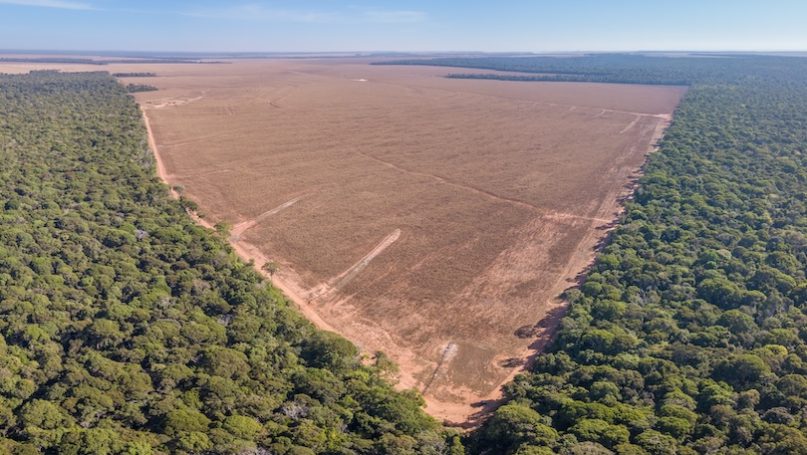
Having officially come into force in June 2023, the European Union’s Regulation on Deforestation-Free Products (EUDR) is one of the primary instruments the European Union (EU) employs in addressing the nature-related impacts of its agricultural imports. Part of the EU’s Green Deal initiative, the EUDR aims to address deforestation and nature degradation involved in the value chains of products entering the European common market. Specifically, the measure targets the cocoa, coffee, soy, palm oil, wood, rubber, and cattle value chains due to their impacts on critically endangered ecosystems around the world. Indeed, the soy and cattle value chains have been identified among the biggest drivers of deforestation in the Amazon, while palm oil extraction has been irrevocably linked to land degradation in the Indonesian and Malaysian peatlands. Within this context, the EU’s Deforestation Regulation has come to be highly regarded by environmentalists and enviroment-focused civil society organizations as an important step in the right direction. By barring the entrance of these products into the European commodities market, the EU hopes to reduce its deforestation footprint.
While the EUDR has been received with overwhelming optimism by some, it has been a cause of concern to others. By targeting products linked to deforestation in ecosystems such as the Peatlands in Malaysia and Indonesia, the Amazon Rainforest in Brazil, and the Gran Chaco plain in Argentina and Paraguay, the measure has been a cause for concern for agriculturalists and government officials in these countries. Critiques of the measure have ranged from allegations of simple economic protectionism, favouring European producers versus foreign ones, to denouncing it as a form of green colonialism.
Essentially, critiques calling the measure green colonialism refer to the perceived imposition of Western environmental standards and policies on nations in the Global South, often without adequate consideration of local contexts or consultation with affected communities. Following its entry into force on June 29, 2023, the EUDR has been harshly criticized by representatives of so-called “High-Deforestation Risk Countries”, such as Brazil, Malaysia, Indonesia and Argentina. An open letter addressed to EU officials, undersigned by 17 producing countries, including those previously mentioned, flagged multiple concerns with the policy. Among which, the letter urged EU leadership to “intensify engagement with producing countries in formulating clear and detailed implementing acts and guidelines for the EUDR, including differentiated compliance and due diligence regimes for commodities and products from smallholders in producing countries”.
Furthermore, in March of this year, the World Trade Organization (WTO) ruled against the EU following a dispute brought forth by Malaysia concerning restrictions placed on palm oil imports originating from degraded peatlands in Malaysia. The core issue revolved around the EU’s enforcement of a 7% maximum share of biofuels in its energy mix and high-risk caps on specific biofuels such as palm oil. The WTO’s ruling highlighted the EU’s failure in managing the high-risk caps, citing delayed data reviews and inconsistencies regarding the equitable treatment among nations as key areas of concern.
That said, much to the chagrin of producer countries, the EU Deforestation Regulation has remained in force. For countries such as Indonesia or Malaysia wherein agriculture makes up an impressive 12% and 8% of their overall GDP respectively, this is a major cause for concern. In 2022, both countries exported a combined 2.5 million metric tons of palm oil to destinations within the EU, making the latter a major commercial partner to Malaysian and Indonesian producers. According to a paper published by the Indonesian Center for Parliamentary Analysis, implementation of the EUDR is set to cause a projected 5.15 billion dollar loss in yearly revenue to Indonesia alone. As such, despite aiming to protect critically endangered ecosystems, the measure is set to negatively impact income opportunities for agricultural commodity exporting countries.
The countries set to be most adversely impacted by the EUDR are countries in the Global South that rely heavily on agricultural exports. As a major business partner for a number of these countries, the EUDR, while a landmark decision for the protection of the world’s ecosystems, also stands to restrict commercial opportunities for lower-income countries. This has spurred outbursts from country representatives who feel the EU aims to dictate the environmental and economic policies of their respective governments. Brazilian minister of Agriculture, Carlos Fávaro, expressed his discontentment with the measure, calling it an affront to and a transgression of the country’s sovereignty. The measure has been called an instance of green colonialism. As such the question remains whether the measure is an appropriate response to land degradation across agricultural value chains, or if it’s a protectionist measure favouring European agriculturalists over those in the Global South.
Ultimately, finding a balance between environmental conservation and economic development remains a complex and ongoing challenge. The EU’s Deforestation Regulation represents a bold attempt to address these issues, but its success will depend on meaningful collaboration and dialogue between all stakeholders, including producing countries, international organizations, and civil society.
Further Reading on E-International Relations
- Opinion – How Trump Undermines Europe’s Climate Ambitions
- The Subsidiarity Principle in EU Environmental Law
- Opinion – Leading the Free World Through a Second Trump Administration
- The New EU-Mercosur Trade Agreement: a New Breath to Free Trade
- Opinion – The Responsibility to Protect the Amazon
- Opinion – Challenges to Kazakhstan’s Transition to the Green Economy